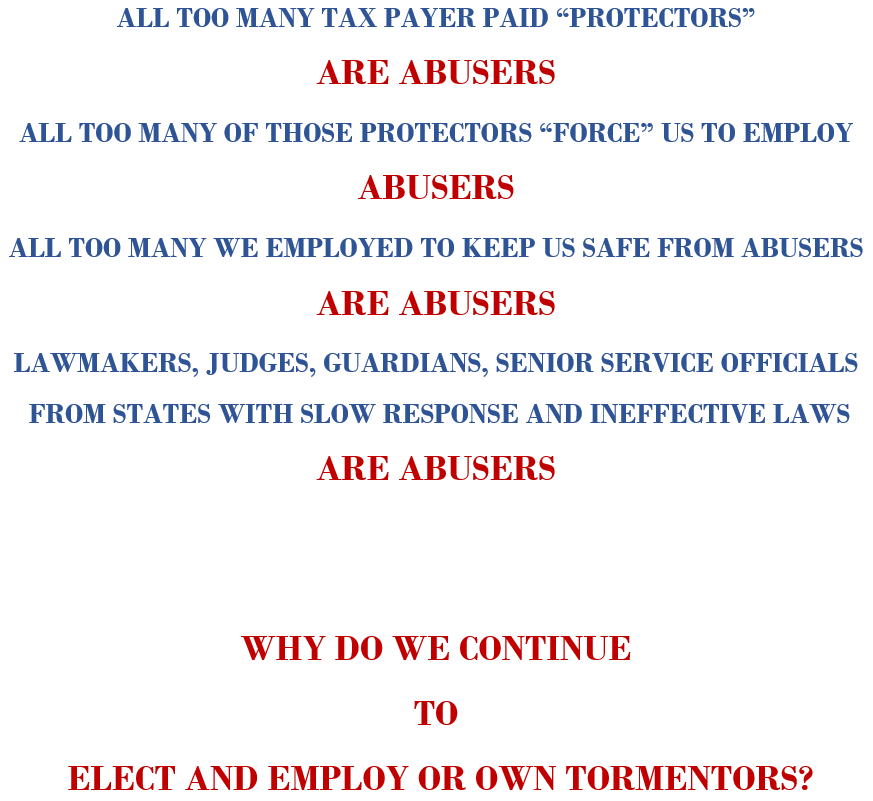The House Select Committee on Aging began talking about elder abuse way back in 1978. In 1981 they issued a report encouraging states to do something—simple encouragement does not go a long way in the halls of government where lobbyists lurk, and 42 years later very few states have done anything substantial—just a few band-aids here and there is about all.
In most states it is mandatory that in order to prosecute financial elder abuse it must be proven that the elderly person suffers from diminished capacities. Retired San Diego Assistant District Attorney Paul Greenwood, the country’s greatest defender of seniors, says that he believes that this is the explanation for so few cases getting prosecuted. As a result, it has now become a full-fledged epidemic. Greenwood and many other experts agree that each state should have a very simple law stating that anyone who steals anything from a person over the age of 65 has committed financial elder abuse, and the penalties for financial elder abuse should be harsh.
Unfortunately, the precision, lack of ambiguity, and almost guaranteed assurance of a quick win for prosecutors of such a law are so obvious that only a politician or lawmaker is unable to understand it. But of course, those of us who do understand it do not chum around with lobbyists.
Lately, the federal government has passed a few laws, but they are nowhere near as effective as they need to be. Individuals who live in states who refuse to protect their senior citizens must be able to turn to the Federal government for protection—they are, after all, Americans first.
The state of Alabama has done a very good job in creating laws that are difficult for a slick lawyer to slip his client through, with well-defined terminology and stiff penalties.
In Alabama, financial exploitation is defined as:
The use of deception, intimidation, undue influence, force, or threat of force to obtain or exert unauthorized control over an elderly person's property with the intent to deprive the elderly person of his or her property or the breach of a fiduciary duty to an elderly person by the person's guardian, conservator, or agent under a power of attorney which results in an unauthorized appropriation, sale, or transfer of the elderly person's property.
Undue influence is defined as:
Domination, coercion, manipulation, or any other act exercised by another person to the extent that an elderly person is prevented from exercising free judgment and choice.
Intimidation is defined as:
A threat of physical or emotional harm to an elderly person, or the communication to an elderly person that he or she will be deprived of food and nutrition, shelter, property, prescribed medication, or medical care or treatment.
Deception is defined as occurring when:
A person knowingly creates or confirms another's impression which is false and which the defendant does not believe to be true.
Fails to correct a false impression which the defendant previously has created or confirmed.
Fails to correct a false impression when the defendant is under a duty to do so.
Prevents another from acquiring information pertinent to the disposition of the property involved.
Sells or otherwise transfers or encumbers property, failing to disclose a lien, adverse claim, or other legal impediment to the enjoyment of the property, whether that impediment is or is not valid, or is not a matter of official record.
Promises performance which the defendant does not intend to perform or knows will not be performed.
Doesn’t that all sound clear and reasonable to you? Can you think of any reason that this sort of law is not on the books in all states?
Well it isn’t.
In the following states’ the laws protect only seniors who are considered legally impaired, dependent, endangered, or vulnerable. So, the widow and widower described earlier in this article would be out of luck—as would be your loved ones unless they are seriously ill or demented:
Alaska, Arizona, Arkansas, Colorado, Delaware, Hawaii, Idaho, Indiana, Iowa, Kansas, Kentucky, Louisiana, Maryland, Michigan, Minnesota, Mississippi, Nebraska, New Jersey, New Mexico
North Dakota, Ohio, South Carolina, South Dakota, Tennessee,
Vermont, Virginia, Washington, Wyoming
The following states do not define undue influence in any way that would make a would-be abuser worry about swift and successful prosecution:
Arizona, Arkansas, California, Colorado, Connecticut
Delaware, Florida, Georgia, Hawaii, Idaho, Illinois, Indiana,
Kansas, Kentucky, Louisiana, Massachusetts
Minnesota, Mississippi, Montana, Nebraska
Nevada, New Hampshire, New Jersey, New Mexico, New York
North Carolina, North Dakota, Ohio, Oklahoma, Oregon
Pennsylvania, Rhode Island, South Carolina, South Dakota
Tennessee, Texas, Utah, Vermont, Virginia, Washington
West Virginia, Wisconsin, Wyoming
The following states do not define deception in any way that would make an abuser worry about prosecution:
Arizona, Arkansas, California, Colorado, Connecticut
Delaware, Florida, Georgia, Hawaii, Idaho, Illinois, Indiana, Iowa
Kansas, Louisiana, Maine, Massachusetts
Michigan, Montana, Nebraska, Nevada, New Hampshire, New Jersey, New Mexico, New York, North Carolina, North Dakota, Ohio, Oklahoma, Oregon, Pennsylvania, South Carolina, South Dakota
Tennessee, Texas, Utah, Vermont, Virginia, Washington
West Virginia, Wisconsin, Wyoming
The following states do not define intimidation in any way that would make an abuser worry about prosecution:
Alaska, Arizona, Arkansas, California, Colorado, Connecticut
Delaware, Florida, Georgia, Hawaii, Idaho, Indiana, Iowa
Kansas, Kentucky, Louisiana, Maine, Maryland, Massachusetts
Michigan, Minnesota, Mississippi, Montana, Nebraska
Nevada, New Hampshire, New Jersey, New Mexico, New York
North Carolina, North Dakota, Ohio, Oklahoma, Oregon
Pennsylvania, Rhode Island, South Carolina, South Dakota
Tennessee, Texas, Utah, Vermont, Virginia, Washington
West Virginia, Wisconsin
Residents of these states, rich or poor, have a legitimate cause for concern. Abusers don’t discriminate when it comes to money—a dollar is a dollar, no matter who you get it from.














 On August 23, 1973 Jan-Erik Olsson pulled a loaded submachine gun and fired at the ceiling of a bank in Stockholm, Sweden. After wounding a policeman, Olsson and a partner took four bank employees hostage, herding them into a bank vault.
On August 23, 1973 Jan-Erik Olsson pulled a loaded submachine gun and fired at the ceiling of a bank in Stockholm, Sweden. After wounding a policeman, Olsson and a partner took four bank employees hostage, herding them into a bank vault. Soon, she is frequently receiving gifts of homemade meals and flowers from their garden.
Soon, she is frequently receiving gifts of homemade meals and flowers from their garden.


 of state and national parks where you can swoosh through quiet winter forests on cross-country trails.
of state and national parks where you can swoosh through quiet winter forests on cross-country trails. has a list of ski areas, links for places to stay and eat, as well as suggestions for the non-skiing members of your family, including dogsledding, snowmobiling, or hunting.
has a list of ski areas, links for places to stay and eat, as well as suggestions for the non-skiing members of your family, including dogsledding, snowmobiling, or hunting. Wyoming ski season generally starts in late November and runs until April. The Travel Wyoming
Wyoming ski season generally starts in late November and runs until April. The Travel Wyoming 

 As we have just begun, we have not yet received any letters. I certainly hope that you will write to us: tell us about your experience with Financial Elder Abuse or Involuntary Guardianship. We will also be looking for people to interview for our monthly video and lovely photographs for our cover.
As we have just begun, we have not yet received any letters. I certainly hope that you will write to us: tell us about your experience with Financial Elder Abuse or Involuntary Guardianship. We will also be looking for people to interview for our monthly video and lovely photographs for our cover.